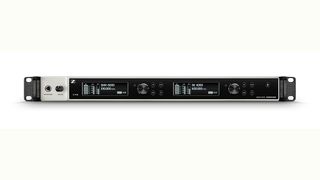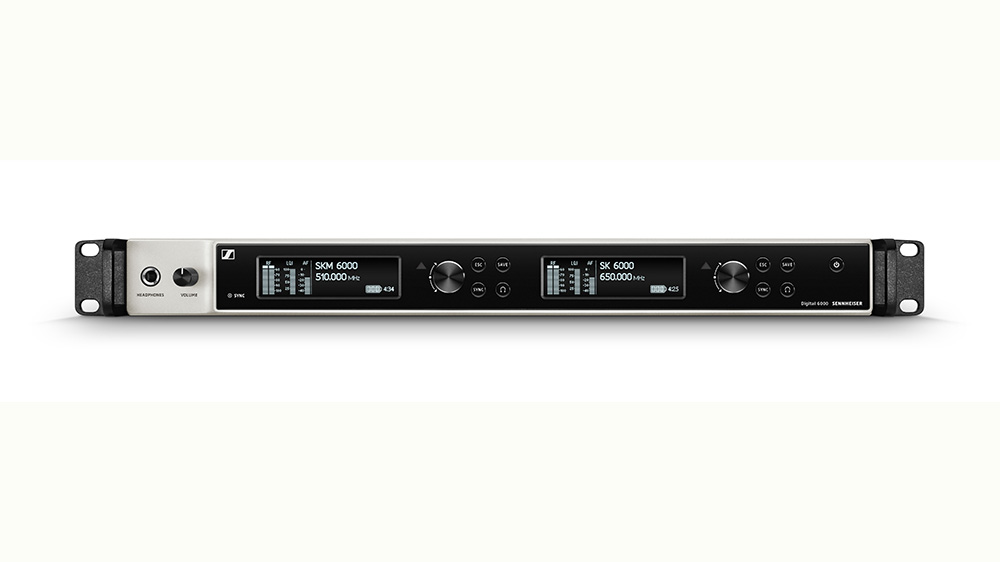The What: Sennheiser’s Digital 6000 Series is a new wireless microphone system comprising a two-channel receiver in two different versions, a bodypack and a handheld transmitter, as well as a rack-mount 19-inch charging unit.

The What Else: The digital two-channel receiver works across a switching bandwidth of 244MHz (470–714MHz), which is covered by three transmitter versions (470–558 MHz, 550–638MHz, and 630–718MHz). For larger systems, up to eight receiver units can simply be daisy-chained without the need for an additional antenna splitter; the multichannel system will work with a single pair of antennas. The system latency is 3 milliseconds.
“With Digital 6000, we have brought the key benefits of our benchmark Digital 9000 system to a two-channel receiver and associated handheld and bodypack transmitters,” said Tom Vollmers, product manager at Sennheiser. “The series is an ideal choice for touring and rental companies, theater and musical productions, broadcasting, houses of worship, and for high-profile corporate customers.”
To improve reliability, Digital 6000 employs true bit diversity, transmission error correction, and additional intelligent error concealment. True bit diversity helps ensure better reception quality than would be possible with other diversity techniques. While switching diversity and true diversity use the RF signal of a single antenna or the audio signal of a single reception path, respectively, true bit diversity uses both reception paths and combines their information content, thus creating the optimum signal.
The Digital 6000 receivers are fitted with a Link Quality Indicator that ensures that issues are seen before any drop-outs occur. If, as in difficult RF environments, the signal should get temporarily corrupted to such an extent that the transmission error correction can no longer repair it, the intelligent error concealment of Digital 6000 sets in. It employs intelligent learning algorithms to replace the corrupted signal, enabling Digital 6000 to still transmit where other digital systems fail.
For data security, a feature that is particularly important for conference and corporate use, Digital 6000 features switchable AES 256 encryption.
A familiar user interface modeled on the EM 3732 receiver ensures simple, reliable operation for the sound engineer. Meanwhile, the Digital 6000’s automatic frequency setup function and the Wireless Systems Manager (WSM) control and monitoring software makes the job of the monitor engineer or dedicated RF engineer easier.
The Digital 6000 receiver is fitted with a white OLED display, which gives a quick overview of the RF signal, link quality, audio signal, battery status, frequency, and encryption. Several home screens provide easy access to further information, without the user having to navigate through submenus. Critical operating conditions and error messages are directly indicated on the display.
Digital 6000 works with standard active and passive UHF antennas, as the frequency-selective antenna filters are contained in the EM 6000 receiver.
The Digital 6000 transmitters use the same high-performance rechargeable accupacks as the Digital 9000 units. The SKM 6000 handheld transmitter is fitted with Sennheiser’s standard capsule interface and can be combined with all the classic microphone heads from the evolution wireless Series, the 2000 Series, and also the special 9000 Series heads.
The SK 6000 bodypack excels as a high-end solution for wireless instruments such as guitar and bass, and is ready for use with the Sennheiser clip-on microphones MKE 1 (omni-directional) as well as the digital-transmission versions of the MKE 2 (omni) and MKE 40 (cardioid).
The L 6000 charger is a 19-inch, 1U device that can be fitted with up to four charging modules, each of which recharges two bodypack or two handheld batteries, respectively. Three-colored LEDs on the front panel give a quick overview of the charging process. More detailed information, as well as additional parameters such as battery runtime, charging cycles, and remaining capacity can be accessed via the Wireless Systems Manager.
As the 6000 Series transmitters are compatible with the Digital 9000 transmitters, the L 6000 charging unit can also be used for Digital 9000.
Digital 6000 integrates easily into digital or analog system infrastructures. The EM 6000 receiver is fitted with a digital AES-3 output, high-quality transformer-balanced analog XLR-3 outputs, and 0.25-inch (6.3mm) jack outputs. The Dante version of the receiver offers an additional Amphenol RJ-45 connector for integration into a Dante network.
The Bottom Line: The Digital 6000 Series of radio microphones is designed to bring outstanding audio quality and solid RF wireless transmission to demanding live productions. The series uses the same long-range mode and proprietary Sennheiser Digital Audio Codec as the Digital 9000, Sennheiser’s top-of-the-range wireless series, and will be available from March 2017.

